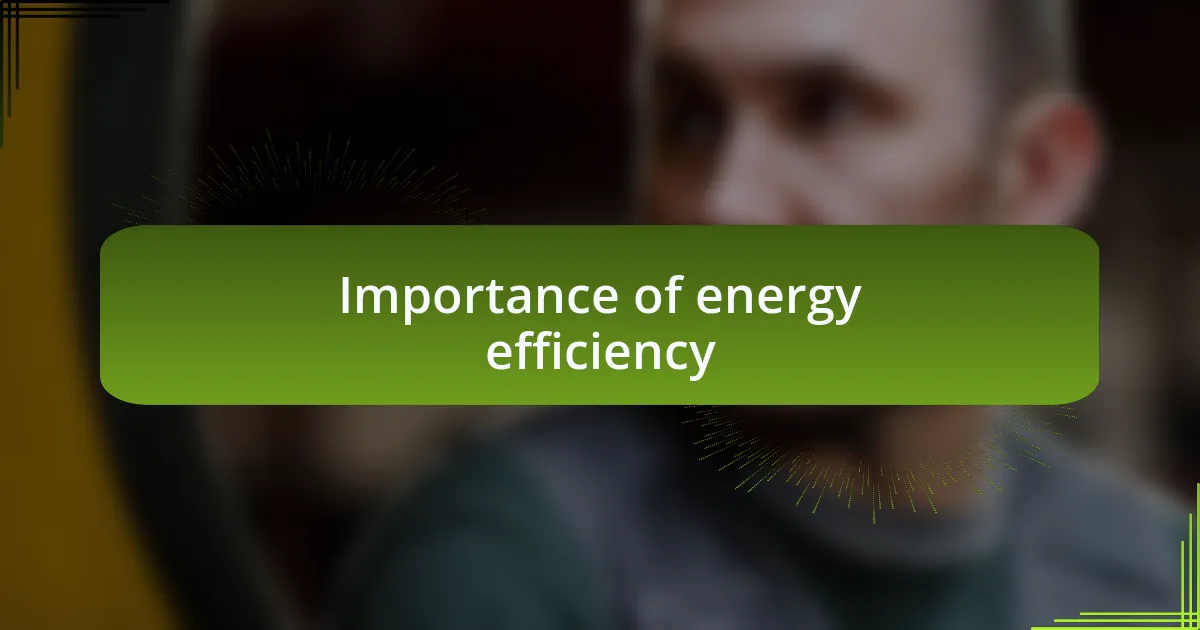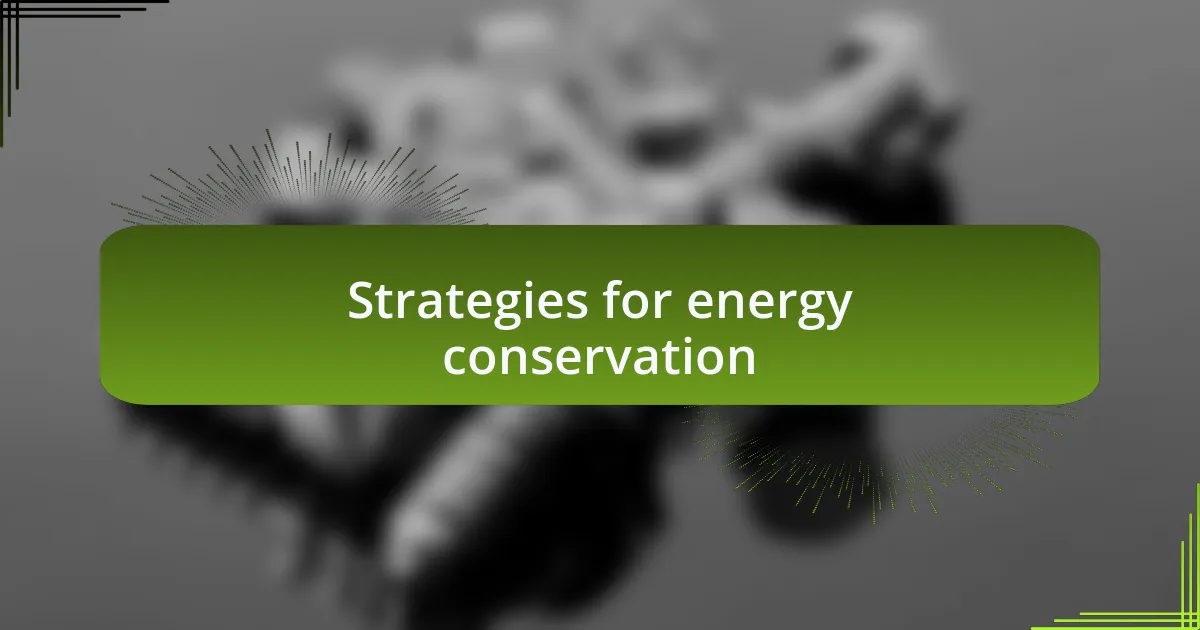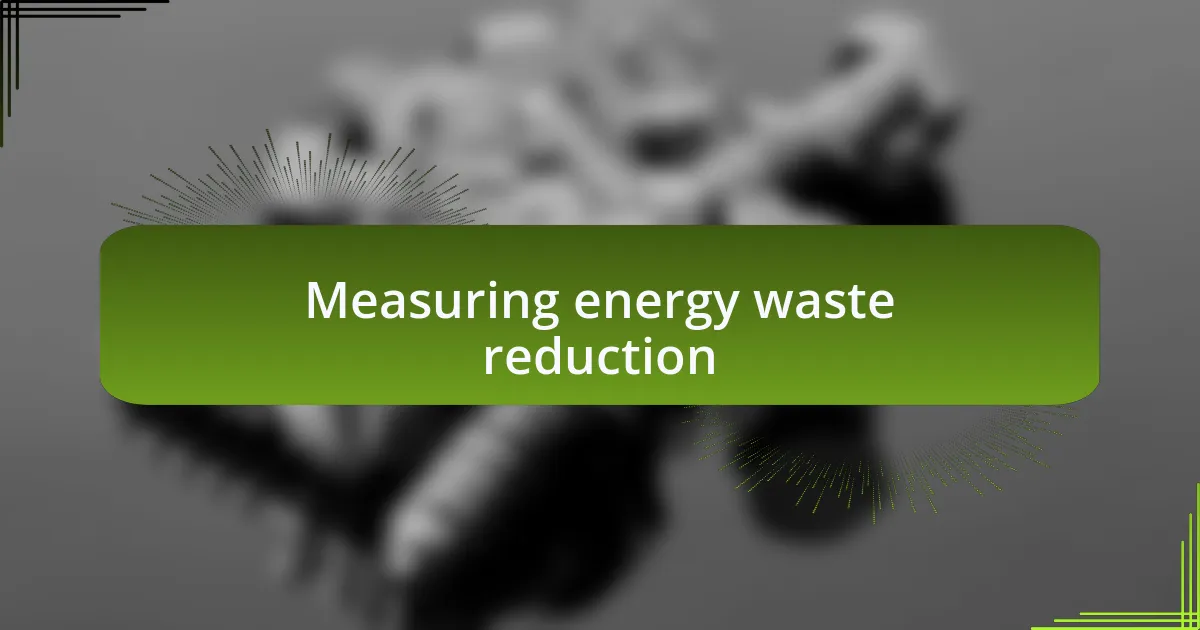Key takeaways:
- Recognizing energy waste through daily habits can lead to significant reductions in energy consumption and costs.
- Implementing energy-efficient technologies and practices, such as smart appliances, can foster sustainability and reduce greenhouse gas emissions.
- Tracking energy usage with monitoring devices and logs helps identify wasteful behaviors, encouraging better energy management.
- Collective efforts in adopting energy-saving measures can lead to substantial environmental benefits.

Understanding energy waste
Energy waste often occurs in environments where efficiency is overlooked. Think about that moment when you last left a room, lights on without a thought—it’s a common oversight. It makes you wonder, doesn’t it? How many small actions accumulate to lead to significant waste?
I recall a time when I realized my old refrigerator was running nearly nonstop, guzzling energy like it was going out of style. It was quite an eye-opener! I often think about those moments; they serve as a reminder that often, our everyday appliances can be the sneaky culprits behind inflated energy bills.
Understanding energy waste isn’t just about numbers and statistics. It’s about recognizing how our habits impact both our finances and the environment. Have you ever considered how a few simple changes in your daily routine could lead to substantial reductions in energy consumption? Just like the journey I took to streamline my own energy use, it can be transformative.

Importance of energy efficiency
Energy efficiency isn’t just a buzzword; it’s a crucial component of sustainability that impacts us all. I remember standing in my kitchen, watching the oven use energy while I prepared a simple meal. It struck me that even small appliances can contribute to a larger footprint. Isn’t it surprising how our daily habits can have such a profound impact on energy use?
Adopting energy-efficient practices can lead to significant financial savings over time. When I upgraded to LED bulbs in my home, I was amazed at the difference in my electricity bill. It really made me think: why had I waited so long to make such an easy change? For many, energy efficiency not only conserves resources but also fosters an immediate sense of responsibility—an awareness of how vital our choices are for the planet.
The importance of energy efficiency is underscored by its role in reducing greenhouse gas emissions. Have you ever thought about how collective actions, like switching to high-efficiency appliances, can create a ripple effect? I often share these insights with friends and family, illustrating how individual efforts can lead to monumental shifts. Together, we have the power to create a more sustainable future, one efficient decision at a time.

Engineering technology solutions
Engineering technology solutions have become pivotal in addressing energy waste. For instance, I recently visited a facility that implemented smart energy management systems. These systems use real-time data analytics to monitor energy consumption, allowing them to identify areas for improvement. It left me questioning how many businesses could benefit from such technology yet remain unaware of its potential.
In my experience, energy-efficient engineering often includes the use of AI and machine learning to optimize energy systems. When I first encountered this technology, I was fascinated by how algorithms could predict energy demand and adjust settings accordingly. This capability doesn’t just enhance efficiency; it transforms how we think about energy consumption. Could employing such advanced solutions in homes and small businesses be the next big leap towards sustainability?
Additionally, the integration of renewable energy sources into engineering designs is an exciting trend. I once took a tour of a local school that had installed solar panels. Seeing the students’ enthusiasm for renewable energy was inspiring. It made me realize that engineering technology isn’t merely about efficiency; it’s also about cultivating a culture of sustainability and innovation in future generations. What if we all embraced these solutions in our daily lives?

Strategies for energy conservation
Incorporating energy-efficient appliances is one of the simplest strategies for reducing energy waste. I remember when I replaced my old refrigerator with an ENERGY STAR-rated model; the difference in energy consumption was significant. It’s astonishing how small changes in our daily choices can drastically lower energy bills and our environmental footprint, don’t you think?
Another effective approach is utilizing programmable thermostats. When I switched to one in my home, it felt like I finally had control over my energy usage. These devices automatically adjust the heating and cooling based on our routines, which not only saves energy but also enhances comfort. Who wouldn’t enjoy coming home to the perfect temperature without wasting energy throughout the day?
Finally, I’ve learned that encouraging behavioral changes within families and organizations can have a massive impact. For instance, I initiated a friendly competition among friends to see who could reduce their energy usage the most in a month. The results were eye-opening! It highlighted how collective awareness and simple actions—like turning off lights or unplugging devices—can make a notable difference. Have you ever considered how such small steps, when taken together, could lead to significant energy savings?

Real world applications of technology
The real-world applications of technology in reducing energy waste are truly impressive. For example, in my own neighborhood, solar panels have become a common sight on rooftops, allowing homeowners to generate their own electricity. I remember chatting with a neighbor who shared how their energy bills dropped dramatically after installation. It’s inspiring to see how individuals can harness the power of the sun and transform their energy consumption.
Smart home technology has also made a substantial impact. I recall visiting a friend’s house equipped with smart lights that could be controlled via an app. They proudly showed me how these lights could be programmed to turn off automatically when no one was home. This kind of innovation really resonates with me—how many times have we forgotten to turn off lights? The convenience of such technology coupled with the energy savings it offers is hard to overlook.
Moreover, the rise of electric vehicles (EVs) is reshaping the transport landscape, thus affecting energy consumption patterns. When I decided to test drive an EV, I was amazed at not just the driving experience, but the potential savings on fuel in the long run. It made me wonder, could shifting more people to electric vehicles significantly diminish our reliance on fossil fuels? The thought of contributing to cleaner air and a more sustainable future felt empowering.

My personal energy saving techniques
One technique I’ve implemented in my daily life is the use of programmable thermostats. I vividly recall the first winter I set mine to lower the temperature at night. Upon waking up to a comfortably warm home, I felt a sense of accomplishment knowing I was cutting down on energy waste while still enjoying comfort. Isn’t it amazing how a simple adjustment can lead to such significant savings on energy bills?
Another strategy I’ve adopted is being mindful of unplugging devices. There was a time when my home was filled with chargers and gadgets, some of which were always left plugged in. A friend pointed out how much energy this “phantom load” was costing me. Now, I make it a habit to unplug when not in use, which not only reduces energy waste but also clears up some clutter. Have you ever thought about how much energy those idle devices could be consuming?
Finally, I’ve taken steps to use energy-efficient appliances. After upgrading to an Energy Star-rated washer, I was genuinely surprised by how much less water and electricity it used compared to my old model. The satisfaction of knowing that I’m making a positive impact on both my bills and the environment is a great motivator. Each small change contributes to a larger commitment to sustainability, doesn’t it?

Measuring energy waste reduction
When it comes to measuring energy waste reduction, I turned to energy monitoring devices. The first time I installed a smart plug, I was shocked to see real-time data on my appliance usage. Watching those kilowatt-hours drop felt incredibly rewarding, almost like witnessing my own progress unfold in numbers. Have you ever found that actually seeing the impact of your actions makes a difference?
I also keep a detailed log of my energy consumption. Initially, I didn’t think it would amount to much, but tracking changes over time revealed patterns I hadn’t noticed before. For instance, I discovered that my evening habits—leaving lights on longer than necessary—were contributing significantly to waste. Realizing this made me more conscious, steering me toward behaviors that have dramatically reduced my overall usage.
Moreover, I found it helpful to benchmark against previous months and seasons. By comparing bills over time, I could clearly identify which strategies produced the best results. This reflection not only drives me to implement more changes but also inspires others around me to join in. There’s something powerful about transforming data into a narrative of improvement, don’t you agree?